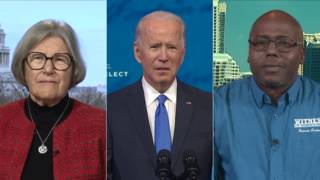Hi there,
I believe that people who are concerned about the climate catastrophe, economic and racial justice and war and peace, are not a fringe minority, not even a silent majority, but the silenced majority—silenced by the corporate media. That's why we have to take the media back—especially now. But we can't do it without your support. Thanks to a group of generous donors, all donations made today will be DOUBLED, which means your $15 gift is worth $30. With your contribution, we can continue to go to where the silence is, to bring you the voices of the silenced majority. Every dollar makes a difference. Thank you so much!
Democracy Now!
Amy Goodman
Hi there,
I believe that people who are concerned about the climate catastrophe, economic and racial justice and war and peace, are not a fringe minority, not even a silent majority, but the silenced majority—silenced by the corporate media. That's why we have to take the media back—especially now. But we can't do it without your support. Thanks to a group of generous donors, all donations made today will be DOUBLED, which means your $15 gift is worth $30. With your contribution, we can continue to go to where the silence is, to bring you the voices of the silenced majority. Every dollar makes a difference. Thank you so much!
Democracy Now!
Amy Goodman
Non-commercial news needs your support.
We rely on contributions from you, our viewers and listeners to do our work. If you visit us daily or weekly or even just once a month, now is a great time to make your monthly contribution.
Please do your part today.
HeadlinesFebruary 25, 2010
US Installs New Governor in Marjah
US troops have installed a new provincial governor in the Afghan town of Marjah nearly two weeks since launching the largest assault of the eight-year occupation of Afghanistan. Over 11,000 US and Afghan troops have battled a few hundred Taliban fighters. The Washington Post reported this week Marjah was attacked not for its military significance, but to “convince Americans that a new era has arrived in the eight-year-long war and to show Afghans that U.S. [and Afghan] forces…can protect them from the Taliban.”
House Votes to Strip Insurers of Anti-Trust Exemption
The House has voted to repeal the health insurance industry’s exemption from anti-trust laws by a vote of 406 to 19. The measure would undo a 1945 law critics say has helped grant the insurance industry a captive market with no curbs on price fixing and other anti-competitive practices. During debate on the House floor, Congress member Anthony Weiner criticized Republican opponents of the bill, calling them “a wholly owned subsidiary of the insurance industry.”
Rep. Anthony Weiner: “They say that what we want is strengthen state insurance commissioners, and they’ll do the job. But when we did that in our national healthcare bill, they said, 'We’re against it.' They said they want to have competition, and when we proposed requiring competition, the Republicans are against it. They’re a wholly owned subsidiary of the insurance industry. That’s the fact.”
In Healthcare Reform, 8 Lobbyists for Every Member of Congress
The House vote comes ahead of today’s bipartisan healthcare summit at the White House. On the eve of the summit, new figures were released underscoring the enormity of healthcare lobbying on Capitol Hill. The Center for Public Integrity says companies and organizations seeking to influence healthcare reform legislation hired over 4,500 lobbyists — eight for every member of Congress. Healthcare lobbyists doubled throughout 2009, reaching nearly 3,700 in the fourth quarter. The group Citizens for Responsibility and Ethics in Washington, known as CREW, meanwhile released figures showing healthcare special interests have invested over $28 million on influential members of Congress since 2005.
Admin Backs Off Consumer Agency, Trading Curbs
The Washington Post is reporting the Obama administration will no longer insist on establishing an independent consumer protection agency as part of an overhaul of financial regulation. White House officials are said to be considering proposals to place the agency inside a different government department, like the Treasury. Top Democrats are also reportedly preparing to drop the administration’s call for limits on the practice known as proprietary trading, in which commercial banks trade financial securities from their own commercial accounts. Former Federal Reserve chair Paul Volcker had proposed the curbs to help undo some of the damage of the 1999 repeal of the Glass-Steagall Act, which had ensured the separation of commercial and investment banking.
Obama Defends Economic Agenda
On Wednesday, President Obama defended his economic policies in a speech before the Business Roundtable, a group of top corporate executives. Obama said his agenda has been unfairly described as “socialism.”
President Obama: “Contrary to the claims of some of my critics and some of the editorial pages, I am an ardent believer in the free market. I believe businesses like yours are the engines of economic growth in this country. You create jobs, you develop new products and cutting-edge technologies, and you create the supply chains that make it possible for small businesses to open their doors. So I want everyone in this room to succeed.”
Senate OKs $15B Jobs Bill
The Senate has passed a $15 billion job-creation package by a vote of 70 to 28. The bill focuses mostly on tax breaks for companies to encourage hiring. The Congressional Black Caucus had criticized the bill for not directing any money to poor communities. Democrats say they plan to unveil a new job package of jobless benefits, state aid and more tax breaks next week.
Senate Extends PATRIOT Act Spy Provisions
In another vote, the Senate backed a one-year extension to three key provisions of the USA PATRIOT Act due to expire this month. The provisions authorize “roving” wiretaps allowing surveillance on multiple phones, seizure of records and property in terrorism raids, and the monitoring of non-US citizens with no proven ties to designated terrorist groups. Democrats had initially proposed adding new privacy protections but relented following Republican objection. The measure now goes to the House.
Blackwater Changed Name to Receive Raytheon Contract
The private military firm Blackwater came under scrutiny Wednesday at a congressional hearing on its operations in Afghanistan. The Senate Armed Services Committee heard testimony the military giant Raytheon asked Blackwater to come up with a different name so it could be awarded a subcontract without stirring controversy. Blackwater created the subsidiary “Paravant” as a result.
Activist Claims Death Threat from Blackwater Employee
During the hearing, an activist with the peace group Code Pink accused a Blackwater employee of threatening his life. The activist, Tighe Barry, stood before Blackwater officials as they exited the room during a recess. Barry held up a sign and called for an end to the use of private contractors like Blackwater. Video footage of the incident shows a Blackwater employee saying something to Barry as he passes by.
Tighe Barry: “We do not need to hire these murderers. There, you get a threat from this guy. He says he’s going to kill me. This is how they react. This is how they run their business. They are trained murderers. They’re killers.”
Barry was referring to Blackwater employee Johnnie Walker, a former program manager for Blackwater subsidiary Paravant in Afghanistan. Barry says he’s filed a complaint against Walker with the Capitol Police.
Toyota Head Apologizes for Safety Recall
In another closely watched hearing, the head of the auto giant Toyota, Akio Toyoda, appeared before a House Oversight Committee panel and apologized for the safety fiasco that’s led to the recall of millions of vehicles.
Akio Toyoda: “We pursued growth over the speed at which we were able to develop our people and our organization, and we should sincerely be mindful of that. I regret that this has resulted in the safety issue described in the recalls we face today, and I am deeply sorry for any accident that Toyota drivers have experienced.”
Udall, Dodd Propose Constitutional Amendment to Reverse Ruling on Corporate Electioneering
In other news from Washington, Democratic Senators Tom Udall of New Mexico and Chris Dodd of Connecticut have introduced a constitutional amendment to reverse the Supreme Court ruling allowing corporations to spend unlimited amounts of money to elect and defeat candidates. In a five-to-four decision last month, the Court overturned century-old restrictions on corporations, unions and other interest groups from using their vast treasuries to advocate for a specific candidate. The Udall-Dodd measure would allow for government regulation of campaign fundraising and spending at the federal and state level.
Ex-Police Lt. Admits to Cover-Up in Post-Katrina Killings
In New Orleans, a retired police lieutenant has pleaded guilty to directing a cover-up of the police killing of two people in the aftermath of Hurricane Katrina. The victims, forty-two-year-old Ronald Madison and nineteen-year-old James Brissette, were crossing the Danziger Bridge in search of food. Madison, who was mentally handicapped, was shot seven times, five in his back. On Wednesday, former New Orleans Police Department Lt. Michael Lohman pleaded guilty to a charge of conspiracy to obstruct justice. Prosecutors say Lohman conspired with other unidentified officers in fabricating witness statements, falsifying incident reports, and planting a gun at the crime scene. After the plea, Ronald Madison’s brother, Romell Madison, spoke outside the courtroom.
Romell Madison: “Tremendous relief for us to see that we have some sort of closure that we’re working on. We’re very happy to see that the rest of the population, our family, other victims, and the citizens of New Orleans, should be relieved that there is still justice for everybody here.”
Lohman’s conviction is the first in the Danziger case. Charges were dismissed against seven police officers in 2008. Prosecutors say their investigation is continuing. Federal investigators are also probing several other police killings of New Orleans residents in the aftermath of Katrina.
Vermont State Senate Votes to Close Nuclear Plant
The Vermont Senate has voted to close the state’s lone nuclear power plant. On Wednesday, the state senators voted to shut the Vermont Yankee plant when its license expires in 2012. The thirty-eight-year-old plant is one of the oldest in the country and has had a series of leaks. The move marks the first time a state has moved to shut down a reactor in over twenty years. Opponents of the plant gathered at the state legislature broke into cheers after the vote was announced. Vermont State Senate President Peter Shumlin said the vote would have national implications.
Peter Shumlin: “I think, from a national perspective, the question is, what does this mean for other states? And I certainly intend to use my power as president of the senate to insure that we make ourselves accessible to other legislators, other governors, who want to understand better how they can empower their states to address the concerns that they might have about their aging nuclear power fleet, what it’s doing to their families, to their communities. So there is a national message in this action today.”
(Related coverage: In Historic Vote, Vermont Poised to Shut Down Lone Nuclear Reactor.)
India, Pakistan Hold Peace Talks
India and Pakistan are holding peace talks today for the first time since the Mumbai attacks of 2008. The Indian and Pakistani foreign ministers are meeting in the Indian capital of New Delhi. India has accused Pakistan of failing to confront militants responsible for attacks inside India territory, while both sides remain divided over competing claims to Kashmir. The talks come as the Obama administration continues to increase weapons sales to both countries. An executive with the consulting firm Deloitte LLP told the Wall Street Journal that India could be “the most important market in the world for defense contractors looking to make foreign military sales.”
Cuba “Regrets” Death of Jailed Dissident
Cuban President Raul Castro has expressed regret over the death of a jailed hunger-striking dissident. Orlando Zapata Tamayo had refused to eat for eighty-five days to protest what he called inhumane jail conditions. Amnesty International had declared him a prisoner of conscience. On Wednesday, Castro said Tamayo had received Cuba’s best medical care and said Cuba “very much regrets” his death. Castro also defended Cuba’s treatment of prisoners, comparing it to the United States.
Cuban President Raul Castro: “In a half a century, we haven’t killed a single person. Here, there was no torture. There was no execution. Here, we haven’t killed anyone unlawfully. Well, here in Guantánamo, there has been torture, but in the Guantánamo naval base, not in our territory.”
Maryland to Recognize Out-of-State Same-Sex Marriages
And back in the United States, Maryland has announced it will now recognize same-sex marriages performed in other states. On Wednesday, the Maryland Attorney General’s Office said it’s also directed state agencies to grant out-of-state couples the same rights they’ve been afforded elsewhere.
Most popular
- 1
- 2
- 3
- 4
Non-commercial news needs your support
Please do your part today.











Media Options